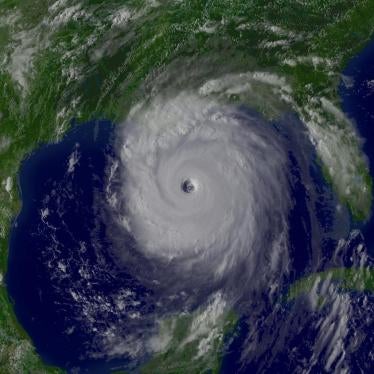Human Rights Watch requests a meeting with Sheriff Marlin N. Gusman because his public statements regarding evacuation plans for prisoners differed from what we found in our investigation.
We would also hope that during such a meeting you would be able to describe for us the evacuation plan for OPP. We understand there had been an evacuation from OPP in the 1990s because of flooding and we assume that OPP had in place specific plans for responding to any repeat occurrence of flooding. We would also like to learn about any precautionary measures you took in advance of the storm (e.g., any stockpiling of water and food).
Your press statements indicate you do not agree with our findings that prisoners spent days in buildings that were flooded, in some, to chest-high level, without food, water, or access to sanitary facilities. Evacuees from one building in particular, Templeman III, also describe officers leaving their posts as the storm hit, and prisoners left in locked cells on the lower levels of the building.
We do not know the source of your version of what happened. Our findings were based on thousands of independent interviews with prisoner evacuees from OPP who are now scattered across the state in at least forty-two different facilities. Every man who has related his account of the conditions at OPP to Human Rights Watch, the ACLU, Louisiana lawyers and family members, provides the same description of events and with remarkable specificity: that there was no food after the storm hit, no water to drink, that the toilets had backed up and released sewage onto the floors and into the floodwater, and that the generators failed, the lights were out, cell doors were sealed shut, and the air stopped circulating in the buildings.
You suggested to the press that these multiple and consistent descriptions are the result of “disgruntled” inmates who “lie.” In our long history of monitoring prison conditions, we have learned that inmates tend to be quite objective and honest in their description of prison conditions. Be that as it may, you should know that seven corrections officers we interviewed corroborate the prisoners’ accounts. Other officers have also acknowledged the terrible conditions at OPP. Chief Deputy Bill Short recounted to the Times Picayune a scene of utter chaos.
We would welcome an explanation for your conclusion that there are no inmates missing from OPP. Your spokesperson, Ms. Renee Lapeyroldrie told us, however, that you have no complete lists of OPP evacuees and their current locations. It is our understanding that the only list of OPP evacuees that you or anyone else has is the one prepared by the Department of Public Safety and Corrections, which was recently updated on September 28. Having carefully compared that list to the list of OPP inmates just prior to the Hurricane, we have identified a total of 328 OPP prisoners who are missing from the DOC list, 118 of whom were housed in Templeman 3. We believe it is incumbent on your department to explain why there are so many names missing from the list of evacuated prisoners.
You have publicly stated that OPP had plenty of water and food during the storm. Yet both corrections officers and OPP evacuees have told us otherwise. Ms. Lapeyroldrie told us that a plan for the facility had been public and on a website just after the storm, but that it has since been removed. She also informed us that the office where the person who may have had the plan on his computer got “quite a bit of water” so that the plan is, at least temporarily, not available. It is surprising that there would only be one computer in the department with a copy of the plan. We also do not understand how officers could have been informed of their specific responsibilities under such a plan if they were not given anything to review. Did they have an oral briefing?
We are certain that you—and the people of New Orleans—share the same goal that we have in ascertaining the facts of the evacuation and drawing any useful lessons for the future from what happened. A meeting, which we would hope would include the senior officer at Templeman III, may be the most useful way to share insights and findings.
We hope you will agree to a meeting as quickly as possible. We will call your office to see when it might be arranged at the earliest possible date.
Sincerely,
Jamie Fellner
Director, U.S. Program
Human Rights Watch







